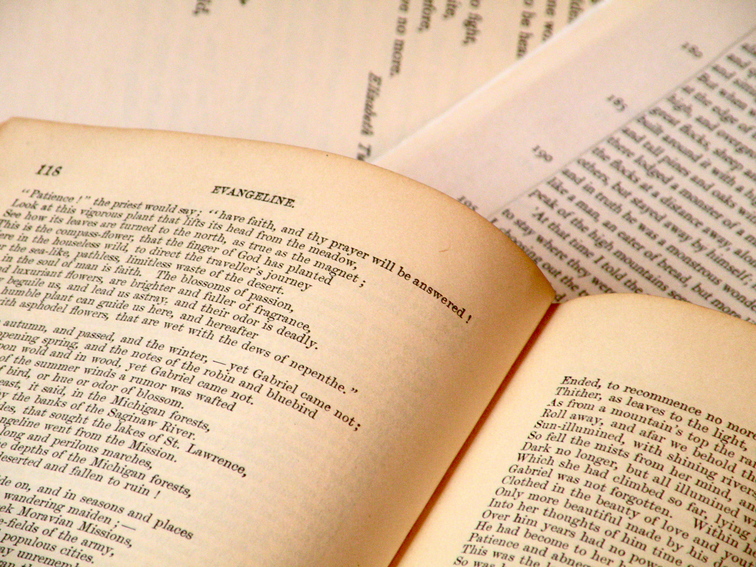
When I was a bit younger I was terribly prejudiced against poetry. In my mind, there were two choices. On one end of the spectrum were the mushy Victorian sonnets and stale nursery rhymes. On the other end were the drug-induced (so my original theory went) compositions of Lewis Carroll and his ilk. (If anyone knows where I can find a "Vorpal Sword" please notify me immediately.)
I was mildly interested in poets like Emily Dickinson, but became irritated when one of her quotes was conspicuously hung in the produce section of my local grocery store. "How luscious lies the pea within the pod." I suppose peas are often luscious, but I never feel tempted to lavish sentimentalities on them in the grocery store. "Prithee, mother, look at the charming pea! We ought to purchase such a fine specimen while it is still on sale!"
I don't know what Lewis Carroll was smoking, but it must have been something very strange. Since Sherlock Holmes has never fallen down a rabbit hole, however, we can conclude that visions of imbecilic card guards and harebrained rabbits are not clinically proven side effects of smoking opium.
Needless to say, I nearly gave up on poetry.
A few years ago, however, I discovered the "Raven." I immediately loved it. Ravens are a special part of my life. They have picked apart my garbage almost as often as the family dog has. One rainy day in July, when a horde of hungry crows had congregated around our green dumpster, my mom threw a leftover smoke-bomb firework out into the driveway to disperse the mob.
Once upon a midnight dreary, while I pondered weak and weary,
Over many a quaint and curious volume of forgotten lore,
Over many a quaint and curious volume of forgotten lore,
While I nodded, nearly napping, suddenly there came a tapping,
As of some one gently rapping, rapping at my chamber door.`'Tis some visitor,' I muttered, `tapping at my chamber door -
Only this, and nothing more.'
I can totally understand why a raven would come rapping at someones door. If I was a large, hungry crow who had been permanently traumatized by a smoke bomb, you bet I would go rapping at a particular person's door. No question about it. Poe was lucky to escape with his life, I tell you!
I recently started reading the poems of Boris Pasternak, the chisel-faced Russian novelist and poet whose career was somewhat impeded by Soviet authorities. My interest was piqued because one of his poems (not sure which) is referenced in Regina Spektor's "Apres Moi," and these days lyrics that assume intelligence on the part of the listener are something novel. (OK, sorry. That was kind of soap-boxy.)
Pasternak's poetic style is indeed morose. But since he is not a Victorian woman swooning over peas, I can forgive a lot.
I could go on about the wonderful T.S. Eliot and Alexander Pushkin, but I won't. You have probably read them and can appreciate their eloquence.
Poetry conveys something that mere prose cannot. Perhaps this is why God ordered sections of the Bible to be in poetic form. Many of the "poems" of David and Solomon are full of the sad and tragic themes we see in the works of the Russian, American, and English poets. But they have a far greater meaning, glorifying God and pointing us towards Christ.
JOB 5
6 For hardship does not spring from the soil,
nor does trouble sprout from the ground.
7 Yet man is born to trouble
as surely as sparks fly upward.
8 "But if it were I, I would appeal to God;
I would lay my cause before him.
9 He performs wonders that cannot be fathomed,
miracles that cannot be counted.
10 He bestows rain on the earth;
he sends water upon the countryside.
11 The lowly he sets on high,
and those who mourn are lifted to safety.
12 He thwarts the plans of the crafty,
so that their hands achieve no success.
13 He catches the wise in their craftiness,
and the schemes of the wily are swept away.
14 Darkness comes upon them in the daytime;
at noon they grope as in the night.
15 He saves the needy from the sword in their mouth;
he saves them from the clutches of the powerful.
6 For hardship does not spring from the soil,
nor does trouble sprout from the ground.
7 Yet man is born to trouble
as surely as sparks fly upward.
8 "But if it were I, I would appeal to God;
I would lay my cause before him.
9 He performs wonders that cannot be fathomed,
miracles that cannot be counted.
10 He bestows rain on the earth;
he sends water upon the countryside.
11 The lowly he sets on high,
and those who mourn are lifted to safety.
12 He thwarts the plans of the crafty,
so that their hands achieve no success.
13 He catches the wise in their craftiness,
and the schemes of the wily are swept away.
14 Darkness comes upon them in the daytime;
at noon they grope as in the night.
15 He saves the needy from the sword in their mouth;
he saves them from the clutches of the powerful.
I think I like poetry.




1 comment:
Hello m'dear,
I finally had some blogging time and really enjoyed looking at all your lovely, vibrant photos! But then I saw this splendid post with no comments and though I must mend that. I too did not appreciate poetry much for a long time, and Emily Dickenson is probably what flipped the switch (as it were) and helped me to appreciate more poetry. I agree that it speaks to our souls in a very different way than prose.
~Meg
Post a Comment